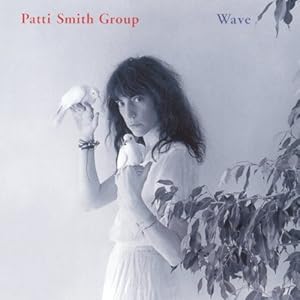There are only two real standout tracks in my opinion: "Frederick," written for her husband, Fred "Sonic" Smith of the MC5, and "Dancing Barefoot," written with composer Ivan Kral.
If this sound like a soft sell... well, it sort of is. Wave doesn't have the same notoriety as Easter and Horses, and while not essential, it's still a good rock album. A very good rock album.The radio-friendly sound doesn't mar the songwriting or the performances in the least, but to be honest, I wanted to feature Wave because one, I'd almost forgotten it existed, and two, I wanted an excuse to write about Patti Smith's inclusion in the pantheon of feminist, or feminist-inspired, rock.
Full disclosure (though probably unnecessary at this point): I am a longtime Patti Smith fan. I finally got to see her perform in 2004, the second time, and as of now the last, she'd play my city. I've been an atheist as long as I've been a Patti Smith fan, and her show was as close as I've ever been to true "religion." That being said, I take issue with some of the things she's done, namely appropriating the "N-word" for a song title, and her place as a feminist icon. As far as I know (unless she's changed her position recently), Patti Smith has never identified as a feminist. On the surface, I have no issue with this. Many women don't, especially those who feel that traditional feminism doesn't serve their needs, but she's always aligned herself with men. Her idols and heros have been these tragic-romantic figures -- Rimbaud, Bob Dylan or Keith Richards -- an essentially "male" archetype. I've always thought of Patti Smith as the prototypical "guy's girl," one who plays well at being one of the boys. And yet, I have to admire her for designing her own gender expression in a time when a woman's role in popular music was typically that of a muse: Taken from Simon Renyolds's The Sex Revolts, this is what she said in a 1993 interview for Details magazine:
All through childhood I resisted the role of confused skirt (emphasis mine) tagging after the hero... I never wanted to be Wendy -- I always wanted to be Peter Pan.I hate saying I give Patti Smith a "pass," because it's important to note that they're were other women making music and creating art during the sixties and seventies without trying to wedge themselves into the boys' club, but they're all but unheard of: folk artists like Cris Williamson and the Chicago Women's LIberation Rock Band. What Patti Smith did was provide an alternate template for those who followed.
Inspiration:
Patti Smith, documentary subject (Feminist Music Geek)
Music Matters: Dream of Life (Bitch Blogs)


No comments:
Post a Comment